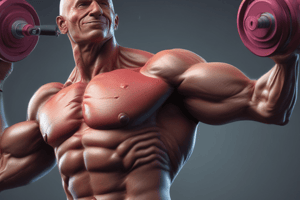Podcast
Questions and Answers
What is the primary purpose of cardiorespiratory endurance?
What is the primary purpose of cardiorespiratory endurance?
- To control balance and equilibrium
- To improve joint range of motion
- To maximize muscle force in a short time
- To enable sustained performance of activities involving large muscle masses (correct)
Which component of fitness refers to the functional capability of joints to move through a full range of motion?
Which component of fitness refers to the functional capability of joints to move through a full range of motion?
- Muscular strength
- Flexibility (correct)
- Coordination
- Muscular endurance
Dynamic warm-up is primarily designed to:
Dynamic warm-up is primarily designed to:
- Increase body temperature only
- Improve static flexibility
- Enhance overall heart rate and blood flow
- Prepare muscles and joints for specific movements (correct)
Power in fitness terminology is best described as:
Power in fitness terminology is best described as:
Which type of warm-up is focused on the particular demands of a given sport?
Which type of warm-up is focused on the particular demands of a given sport?
What is the main function of mobility drills?
What is the main function of mobility drills?
Which of the following best defines agility in the context of physical fitness?
Which of the following best defines agility in the context of physical fitness?
What type of warm-up method usually improves flexibility while being combined with or used after dynamic movements?
What type of warm-up method usually improves flexibility while being combined with or used after dynamic movements?
Flashcards are hidden until you start studying
Study Notes
Fitness Components
- Organic Vigor: Influences the cardiovascular and respiratory efficiency, enhancing disease resistance.
- Cardiorespiratory Endurance: Essential for sustaining activities using large muscle groups over extended durations through effective oxygen transportation by the lungs and heart.
- Muscular Endurance: Involves the muscle's capability to perform repeated submaximal forces or maintain contractions over time.
- Muscular Strength: Defined as the maximum force exerted in a single effort against resistance.
- Flexibility: Relates to a joint's functional capacity, allowing movement through a full range of motion.
- Speed: The individual's ability to execute consecutive movements rapidly.
- Agility: Refers to the capability to swiftly change position in space and the quickness of overall movement.
- Power: Relates to muscular power, indicating the ability to exert maximum force in the shortest time.
- Balance: The ability to maintain equilibrium and control body position through neuromuscular coordination.
- Coordination: The skill of integrating sensory information with body movements for smooth and precise task execution.
Warm-Up Types
- General Warm-Up: Aims to elevate overall body temperature, increase heart rate, and boost blood flow to muscles.
- Dynamic Warm-Up: Prepares muscles and joints for workout-specific movements through active mimicry of the intended activities.
- Sport-Specific Warm-Up: Tailors the body's preparation to meet the unique demands of a particular sport or activity.
- Stretching as a Warm-Up: Focuses on enhancing flexibility and range of motion, often combined with dynamic movements for effectiveness.
- Mobility Drills: Enhances joint flexibility and range of motion, particularly beneficial before weightlifting or high-intensity sports.
Studying That Suits You
Use AI to generate personalized quizzes and flashcards to suit your learning preferences.




